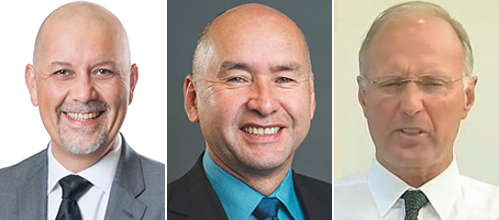The cop status quo stands,
thanks to five self-serving MLAs
Another sham legislative committee entrenches
the OPCC’s lack of transparency and accountability
November 30, 2019
MLAs Garry Begg, Mike Morris, Adam Olsen, Ellis Ross
and Rachna Singh preserved a corrupt public agency
that acts in near-secrecy and answers to no one.
Thirty-eight recommendations and no meaningful changes. True to form for the legislature at large, five MLAs chose to uphold an ethically corrupt system of police accountability based on near-secrecy and zero accountability. That was the unanimous decision of B.C.’s all-party Special Committee to Review the Police Complaint Process.
Contrary to some early indications, the five MLAs didn’t recommend expanded civilian investigation of cops. I thought they would, based on supportive comments for such a move by Clayton Pecknold and Josh Paterson. The fact that those two, respectively establishment former-cop and establishment perma-suck, would dare suggest such a thing gave me the impression they had permission from above. For a while it seemed like B.C.’s solicitor general and long-time cop supporter Mike Farnworth was seeking a legacy accomplishment before he peters out into retirement. But apparently not.
Apart from the problem of cops investigating cops, the five MLAs ignored the fact that B.C.’s Office of the Police Complaint Commissioner obviously lacks transparency and accountability. That’s an especially serious problem given the OPCC’s 21-year history of ethical corruption, ranging from Don Morrison’s disreputable conduct, through cop lawyer Dirk Ryneveld’s disgraceful tenure to Stan Lowe and his blatant cover-ups involving Vancouver cop Taylor Robinson, New Westminster cop Sukhwinder Vinnie Dosanjh, Saanich cop Brent Wray and Victoria cop Frank Elsner, to name a few that have accidentally come to light. The five MLAs entrenched the system that makes these cover-ups so easy and, when they’re found out, free of repercussions for the people conducting the cover-ups.
The closest the MLAs came to addressing the OPCC’s lack of transparency and accountability was in this recommendation: “Examine ways to facilitate opportunities for a broader range of designated observers to monitor the police complaint process in the interest of increased transparency, understanding and insight.” Buried among more minor suggestions, nothing if not vague and more a brush-off than a recommendation, this hardly addresses the OPCC’s most glaring problems.
The five MLAs rigged the process. They rejected my request to appear at any of their hearings, falsely implying that I’m not a stakeholder. I’ve been through the police complaint process and I’ve been an on-and-off activist for over a decade. But the five MLAs limited their definition of stakeholders to groups representing cops, ex-cops, natives and immigrants.
The committee consisted of ex-cops, natives and an immigrant.
Their strategy blocked informed criticism. The groups representing cops and ex-cops stuck up for themselves. The native and immigrant groups didn’t know anything about the subject.
The five MLAs allowed me to send a written submission but warned me they might reject the submission outright if it referred to any actual case. They didn’t impose that restriction on others who made written or in-person presentations.
Even then the MLAs disregarded my suggestions, which they might not have bothered to read anyway. Those who were granted in-person meetings benefited from a Q&A discussion following their presentations and had their remarks recorded in the Hansard. Written submissions were relegated to an obscure part of the committee’s website and most of them seem to have been given scant, if any, attention by the MLAs. And again, they placed unique restrictions on mine.
This exercise will disappoint anyone who hoped that natives or Greens would bring some integrity to B.C.’s political environment. It turns out that the two natives (one of whom is Green) fit right in.
One new twist but another cynical manoeuvre by the committee is the use of woke rhetoric. This shows the self-serving interplay of those who represent entrenched power, like the MLAs, and those who pretend to oppose it, like the Pivot Legal Society. From Pivot, the MLAs picked up a lot of Titania McGrath-type jargon that tries to mask the committee’s status quo stance.
The committee’s wokeness blends into fashionable UNDRIP-influenced recommendations that won’t do anything to prevent the OPCC cover-ups that in at least one case involved a victim who was native, as well as disabled.
Despite their lofty proclamations, native MLAs Adam Olsen and Ellis Ross
joined three other committee members to give then-deputy police complaint
commissioner Rollie Woods a respectful hearing. Woods’ role in the OPCC’s Robinson
cover-up smacks of contempt for natives, as well as the poor and disabled.
For Olsen, it’s his second such un-UNDRIP suck-up. He also took part in the previous
remunerative committee decision to thank OPCC cover-up king Stan Lowe for his work.
Pivot’s contribution to these racial recommendations also stink of hypocrisy, given the organization’s involvement in that case. Pivot knew the VPD and OPCC were covering up Robinson’s assault on Sandy Davidsen, but failed to speak up. That might have reflected mere incompetence on Pivot’s part, but given the grasping ambitions of these establishment wannabes, it could reflect active collaboration. Additionally, for years Pivot’s most prominent poverty pimp was Doug King, quite possibly a crypto-racist for his refusal to work in the black and Hispanic inner-cities of his own country.
To Pivot’s credit, and almost miraculously, the poverty pimps also suggested the OPCC be made accountable, although they carefully buried that under-stated suggestion under a lot of recently received racial rhetoric. The MLAs ignored that Pivot recommendation (as they did mine), but don’t expect the downtown eastside opportunists to object. They have their careers to consider.
Of course the MLAs’ careers would be at stake too, if the MLAs dared take a stand. This unanimous report, like all the invariably unanimous recommendations and decisions about police accountability made in committee or legislature, depends on the key aspect of B.C.’s political culture—party bosses ordering around really inadequate elected reps. The inadequates don’t dare jeopardize the pay, perks and pensions they couldn’t nearly get in a real job. In addition to the standard 3P remuneration are the hefty bonuses that come from assignments like committee work. If the MLAs don’t follow orders, they don’t get further lucrative bonuses.
This sham process also included an “audit” conducted by something called Enterprise Risk Services. Their job was to praise the OPCC’s work while pointing out some numerically quantifiable and minor shortcomings. B.C.’s courtier media will think that gives the OPCC accountability.
The committee’s report most likely was written by one or more ghostwriters, quite possibly with laughably confused input from the MLAs: “The boss says make sure there’s lotsa indigenous stuff in there.” Or maybe a go-between related the boss’ orders more directly and clearly to the ghostwriter. All that provides good material for satire but a discouraging scenario for anyone naive enough to hope for reform.
Just following orders: Some reflections on how B.C.’s arrogant
but subservient political culture props up corrupt institutions
Read more about B.C.’s
Office of the Police Complaint Commissioner
Go to News and Comment page

